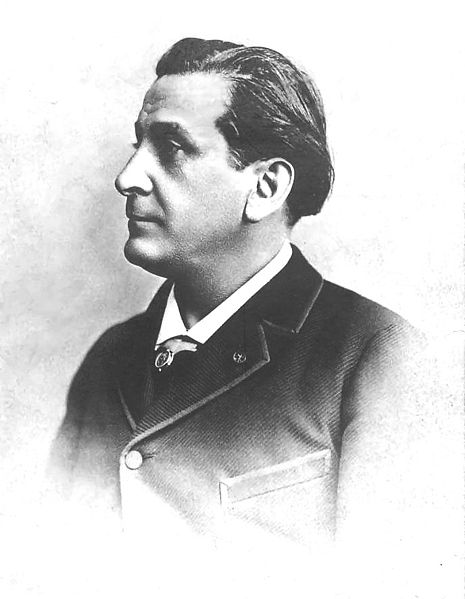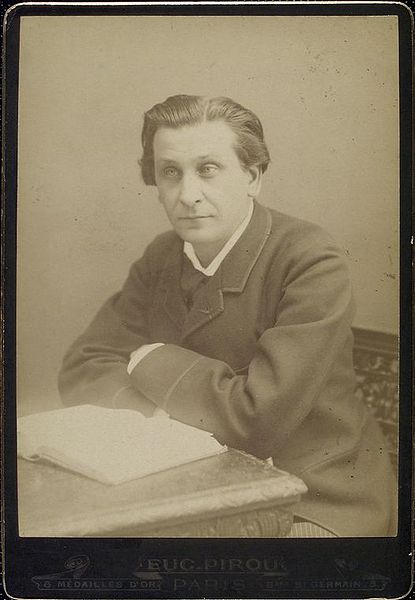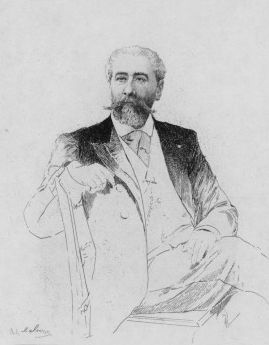<Back to Index>
- Writer François Edouard Joachim Coppée, 1842
- Poet José - Maria de Heredia, 1842
PAGE SPONSOR


François Edouard Joachim Coppée (26 January 1842 – 23 May 1908) was a French poet and novelist.
He was born in Paris to a civil servant. After attending the Lycée Saint Louis he became a clerk in the ministry of war, and won public favor as a poet of the Parnassian school. His first printed verses date from 1864. In 1869 his first play, Le Passant, was received with approval at the Odéon theater, and later Fais ce que dois (1871) and Les Bijoux de la délivrance (1872), short poetic dramas inspired by the Franco - Prussian War, were applauded.
After holding a post in the library of the senate, Coppée was chosen in 1878 as archivist of the Comédie Française, an office he held till 1884. In that year his election to the Académie française caused him to retire from all public appointments. He was made an officer of the Legion of Honor in 1888.
Coppée was famed as le poète des humbles (the poet of the humble). His verse and prose focus on plain expressions of emotion, patriotism, the joy of young love, and the pitifulness of the poor. He continued to write plays, mostly serious dramas in verse, two in collaboration with Armand d'Artois. The performance of a short episode of the Commune, Le Pater, was prohibited by the government in 1889. Coppée published his first prose work in 1875 and went on to publish short stories, an autobiography of his youth, a series of short articles on miscellaneous subjects, and La Bonne Souffrance, a popular account of his reconversion to the Roman Catholic Church. His conversion was due to a severe illness which twice brought him close to death. He was also interested with public affairs, joining the most violent section of the Nationalist movement (while remaining contemptuous of the apparatus of democracy) and taking a leading part against Alfred Dreyfus in the Dreyfus affair. He was one of the founders of the Ligue de la Patrie Française.
The poet Arthur Rimbaud, a young contemporary of Coppée, published numerous parodies of Coppée's poetry. Rimbaud's parodies were published in L'Album Zutique (in 1871? 1872?). Most of these poems parody the style ("chatty comfortable rhymes" that were "the delight of the enlightened bourgeois of the day") and form (Alexandrine couplets arranged in ten line verses) of some short poems by Coppée (examples can be found in the collection Promenades et Intérieurs). Rimbaud published them under the name François Coppée.

José - Maria de Heredia (22 November 1842 - 3 October 1905) was a Cuban born French poet. He was the fifteenth member elected for seat 4 of the Académie française during 1894.
Heredia was born at Fortuna Cafeyere, near Santiago de Cuba, of Spanish Criollo and French ancestry. At the age of eight he went from the West Indies to France, returning then to Havana at age seventeen, and finally making France his home not long afterwards. He received his classical education with the priests of Saint Vincent at Senlis, and after his visit to Havana he studied at the Ecole des Chartes at Paris. During the later 1860s, with François Edouard Joachim Coppée, René François Armand Sully - Prudhomme, Paul Verlaine and others less distinguished, he was one of the poets who associated with Charles Leconte de Lisle, and were given the name of "Parnassiens".
To this new school, form - the technical part of their art - was of supreme importance, and, as a reaction against the influence of Alfred de Musset, they repressed in their work the expression of personal feeling and emotion. "True poetry," said M. de Heredia in his discourse on entering the Academy - "dwells in nature and in humanity, which are eternal, and not in the heart of the creature of a day, however great." De Heredia wrote very little, and published even less, but his sonnets were circulated in manuscript form, and gave him a reputation before they were published during 1893, together with a few longer poems, as a volume, with the title Les Trophées. In the original work, he called to his great friend, Ernest Jean - Marie Millard de Bois Durand, watercolor painter, Montmartre, to illustrate his book of original watercolors.
He was granted French nationality during 1893 and was elected subsequently to the Académie française on 22 February 1894, in the place of Charles de Mazade the publicist. Few purely literary men can have entered the Academy with so few credentials. A small volume of verse - a translation, with introduction, of Diaz del Castillo's History of the Conquest of New Spain (1878 – 1881) - a translation of the life of the nun Alferez (1894), Thomas de Quincey's "Spanish Military Nun" - and one or two short pieces of occasional verse, and an introduction or so - this is but small literary output. But the sonnets are of their kind among the most skilled of modern literature. "A Légende des siècles in sonnets" M. François Coppée termed them. During 1901 de Heredia became librarian of the Bibliothèque de l'Arsenal at Paris. He died at the Château de Bourdonné in Seine - et - Oise on the 3 October 1905, having completed his critical edition of André Chénier's works.